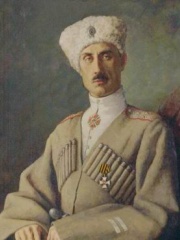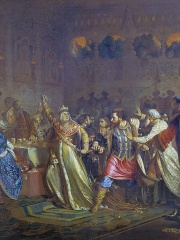

The Most Famous
NOBLEMEN from Lithuania
This page contains a list of the greatest Lithuanian Noblemen. The pantheon dataset contains 1,415 Noblemen, 2 of which were born in Lithuania. This makes Lithuania the birth place of the 37th most number of Noblemen behind Georgia, and North Korea.
Top 2
The following people are considered by Pantheon to be the most legendary Lithuanian Noblemen of all time. This list of famous Lithuanian Noblemen is sorted by HPI (Historical Popularity Index), a metric that aggregates information on a biography's online popularity.

1. Pyotr Wrangel (1878 - 1928)
With an HPI of 71.33, Pyotr Wrangel is the most famous Lithuanian Nobleman. His biography has been translated into 52 different languages on wikipedia.
Baron Pyotr Nikolayevich Wrangel (Russian: Пётр Николаевич Врангель [ˈpʲɵtr nʲɪkɐˈlajɪvʲɪtɕ ˈvranɡʲɪlʲ]; August 27 [O.S. August 15] 1878 – 25 April 1928) was a Russian military officer of Baltic German descent. A veteran of the Russo-Japanese War and World War I, he rose to become a commanding general in the anti-Bolshevik Volunteer Army during the Russian Civil War. In 1920, he became the last commander-in-chief of the White forces in Southern Russia, which he reorganized as the Russian Army. After graduating as a mining engineer, Wrangel volunteered for service in the Russo-Japanese War, where he decided on a military career. A graduate of the Imperial General Staff Academy, he distinguished himself during World War I, becoming one of the first Russian officers to be awarded the Order of St. George for heroism. He rose to the rank of major general. After the October Revolution, Wrangel joined the Volunteer Army in August 1918 and was given command of major cavalry formations. He became known for his aggressive leadership and battlefield successes in the northern Caucasus. In 1919, he captured the strategic city of Tsaritsyn but soon clashed with his superior, Anton Denikin, over the latter's Moscow Directive, a plan Wrangel considered strategically flawed. The growing rivalry led to his dismissal from command in December 1919. Following Denikin's resignation in April 1920, Wrangel was elected commander-in-chief of the shattered White forces in Crimea. He established the Government of South Russia and attempted to win popular support with a wide-ranging series of reforms, including a radical land reform. After initial military successes against the Red Army, his forces were defeated, and he organized a mass evacuation from Crimea in November 1920, successfully evacuating over 145,000 people. In exile, he remained a leader of the White movement and founded the Russian All-Military Union (ROVS) in 1924. He is remembered as the last commander of the White Army, a more able administrator and strategist than his predecessors, who took command when the White cause was already considered lost.

2. Sophia of Lithuania (1371 - 1453)
With an HPI of 63.09, Sophia of Lithuania is the 2nd most famous Lithuanian Nobleman. Her biography has been translated into 19 different languages.
Sophia Vitovtovna of Lithuania (Lithuanian: Sofija Vytautaitė, Russian: Софья Витовтовна, romanized: Sofya Vitovtovna; 1371 – 1453) was the grand princess of Moscow as the wife of Vasily I from 1391 to 1425. She was regent for her son Vasily II from 1425 to 1432. Her father was Vytautas, the grand duke of Lithuania.
People
Pantheon has 2 people classified as Lithuanian noblemen born between 1371 and 1878. Of these 2, none of them are still alive today. The most famous deceased Lithuanian noblemen include Pyotr Wrangel, and Sophia of Lithuania.

